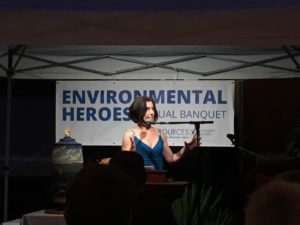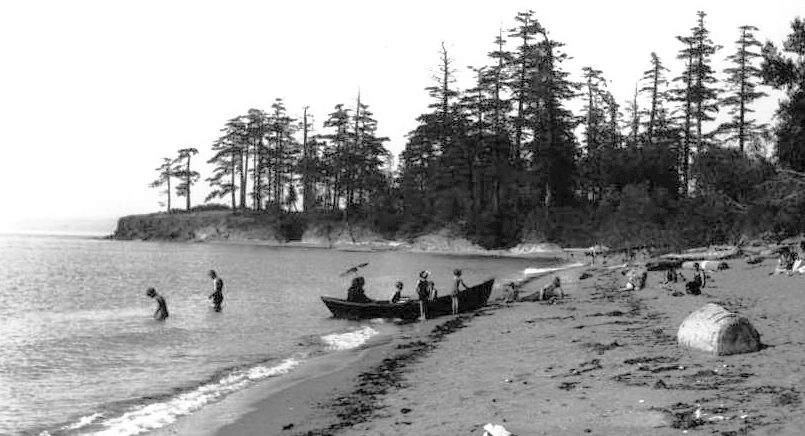My speech from  the 2016 RE Sources for Sustainable Communities Environmental Heroes Banquet. My part of the evening was to discuss how our community became involved in fighting (and defeating!) the proposed coal port at Cherry Point / Xwe’chi’eXen. Here it my speech, as written, though in person I sometimes wander from the page.
the 2016 RE Sources for Sustainable Communities Environmental Heroes Banquet. My part of the evening was to discuss how our community became involved in fighting (and defeating!) the proposed coal port at Cherry Point / Xwe’chi’eXen. Here it my speech, as written, though in person I sometimes wander from the page.
“I’m delighted to be here with you all, to be part of this community, standing on this Coast Salish ground, in this place we call home.
All of us here tonight, and so many others, were part of the fight against the proposed coal port. As none of us can speak for all of us, all of our personal stories, I want to tell part of my personal story in hopes that it might resonate with yours.
Mine begins years ago, when I was a teenager growing up in Bellingham. This was during the Reagan years, the last throes of the Cold War, when we were afraid of what Reagan might do with his red phone and the nuclear codes. We were afraid of nuclear war. By that point, we all knew that “duck and cover” wasn’t an option, that nuclear war would be an apocalypse. So I came up with an apocalypse escape plan.
I had a little green sailboat, single mast. It could also be a row boat. I used to go out in my little boat, usually just a few feet away from the shore, and read. My apocalypse escape plan was that, in the event of nuclear war, I would load up my little boat and sail out into the Salish Sea. Somehow, the islands and the waters would provide refuge, sanctuary. The Salish Sea would allow me to escape, or survive, the apocalypse.
Coincidentally, my husband, whom I did not know at the time, had a similar plan. He didn’t have a little sail boat, he had a canoe. I like to think that our paths would have crossed on the water, had we been forced to escape the apocalypse in the 80’s.
But that apocalypse didn’t happen. The 80’s passed, I moved away from the Salish Sea, and then, some years ago, I came back.
I came back, became a mother, and started again worrying about the apocalypse. Not worrying, but freaking out. I couldn’t sleep because I’d have vivid nightmares of apocalypse. This time the apocalypse I feared was not nuclear war, but climate change. I would wake, sweating over scenes of drought and heat and war and havoc, scenes of the world gone haywire, scenes of the world into which I was bringing my new son.
This happened right around the time that word about the proposed GPT coal port got out. My raging maternal hormones reacted to this news with a huge NO. My NO was emotionally violent, survivalist, irrational. It was not broad-minded or altruistic, it was the NO of a mother defending her infant. I was enraged.
But then I calmed down and got involved. As I became engaged with the coal port issue, I began to see how much my long-time refuge and safe harbor, the place that in my teen apocalypse fantasies was to have protected me, the Salish Sea, needed protecting.
As I became engaged, I saw that friends and neighbors and people all around me, were doing the exactly the same. We were becoming engaged with the coal port issue.
Each of us came with our personal motivations: we worried about climate change, we worried about coal trains, super-sized tankers, mountains of coal dust. We worried about what it would mean to become a fossil fuel export hub. We worried about ugliness of it all, the hassle, the various costs to be incurred.
Each of us played to our strengths. Organizers organized, protestors protested, lawyers legalized, business owners considered economic impacts, medical people studied the potential costs to human health and life, intellectuals and scientists took on research, communicators tried to get the word out, philanthropists gave money, tribal nations exercised treaty rights, citizens showed up.
Citizens showed up.
To a remarkable degree, egos were set aside in favor of common cause.
Some of us worked as part of a larger organization, others formed local organizations, some of us acted solely on our own. We all communicated regularly, respected one another’s positions and contributions, and we acted strategically.
We fought to protect treaty rights, sacred lands, shared lands, shared air, shared waters. We fought for the killer whales and the salmon and the crows and the cedar trees. We fought for ourselves, our friends, our family, our neighbors, we fought for our our elders, our ancestors, our children, our children’s children.
In fighting for this place, we defined ourselves and our commonly held values. We care ferociously. We care about one another, we care about this place, and all that lives here. We care about the history of this place, the spirit and culture and beauty of this place.
And as I became engaged with the coal port issue, I began to really think deeply about coal, about the beginning of the coal in the stripped land of the Powder River Basin and the end of it, in coal plants in Asia. I began to imagine my my mirror-image, a woman in China who has to put a mask over her son’s face before he goes outside the home because those coal-burning plants have made the air too dirty to breathe.
In fighting with this community and for this place, I began to see how various communities and places are all connected. Our local battle was about the proposed coal port, it was about our home, and our battles will continue to be about our home. We must meet the battles that come to us. But, of course, the places we call home are all connected. Our struggle is connected to those of Keystone, of the Arctic, of Nigeria and Venezuela and Yemen and the Alberta tar sands, of Standing Rock. The fossil fuel infrastructure connects us, the struggle against catastrophic global warming connects us, the working towards a dream of a safe, healthy, vibrant and living home connects us.
In standing with this community and for this place, my understanding of place was deepened and enlarged. I thought a lot about the word environment, and decided I didn’t like it, it didn’t feel true in that it implies that nature is something outside of our bodies, nature is something that surrounds us. It’s not. We are part of nature. We are part of this planet. We don’t exist without clean water and breathable air. Nature doesn’t need us, but we certainly need her.
As a community we were given a deeply meaningful fight, a fight that could affect not only our own lives but could also deal a real blow to fossil fuels. We were given the opportunity to simultaneously work for the Salish Sea and work against climate change. We made friends, we got to know our neighbors, we continued to learn who we are as a community.
In some ways, the proposed coal port fight turned out to be a huge gift.
Especially since we won.
All around the world, there are ancient tales and sacred stories of floods. The Epic of Gilgamesh, the Bible, the Great Flood of China, Athabaskan, Algonquin, the Cowichan, people all over the world have these stories. Often, there is warning that goes largely unheeded. A flood comes and wipes out a civilization, a people, and only a few survive. Refuge is taken in a boat. An ark, a small sailboat, a canoe.
The flood is coming. The glaciers are melting more rapidly than we thought they would, the ocean currents are changing, fires are swallowing our forests whole, hurricanes are raging, there are droughts, there are crazy rains. And the seas are rising, threatening entire countries, and all coastal communities. The seas are rising. The flood of myth, the world-consuming flood is coming.
And yet, I no longer have apocalypse nightmares. Despite the acceleration of climate change, despite the continuing refusal of our governments and corporations to implement broad and effective clean energy and conservation policies, I no longer wake in the middle of the night afraid of the world that we will leave to my child, to all of our children. Climate change is upon us, it will become ever more apparent, ever more difficult, but we can still affect the degree of change, the type of change it will be. It could be apocalyptic, or it could be one of resilience and ingenuity.
My nightmares have made way, if grudgingly, for a dream of a changed, but reasonable, future. If we continue act as we have acted, that future might even be a beautiful one.
What I have learned is that, though the flood is coming, we have an apocalypse escape plan. We have an ark, a small sailboat, a canoe. That vessel is this community, it’s us, all of us, connected, working together, pulling together.
Thank you! “
